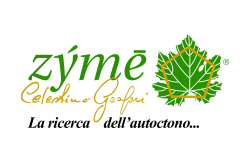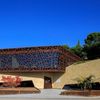Zyme
The name Zýmē, from Greek, means “yeast.” Yeast is, of course, an indispensable element in the world of oenology, but it also bears a symbolic meaning, since it conjures up the concept of naturalness, a fundamental value in Celestino Gaspari’s professional and existential journey, as well as the process of fermenting, understood as a continuous striving towards transformation. In harmony with that philosophy, the winery logo represents a grapevine leaf in which is centered a pentagon, symbol of the five basic elements that combine to yield wine: man-vine-earth-sun-water.
Re-establishing an ideal habitat where man and nature are in perfect symbiosis is, in fact, the point of both departure and arrival of a new humanism of the earth, of which Celestino Gaspari and Zýmē are promoters.
This new worldview has as its objective the establishing of a new relationship with the environment, with man as the natural guardian of his local corner of earth, the one who protects it, but also the one who can renew it, reinterpret it.
Eco sustainability with respect to vineyard management practices, transparency of the final product through understanding of its production processes, and respect for the rhythms of nature: these are the cardinal principles of Zýmē’s approach to winemaking.
The approach is an element and symbol of a simple style of living in synchronicity with the earth, in a historical moment in which man, bewildered by the opulence of a false well-being, has put at risk his own survival.
Tradition and innovation are the two complementary tracks on which Zýmē’s wine production moves forward: respect for, and attention to the historic wines of the Valpolicella area go hand in hand with innovation and experimentation with new wines that will enhance and renew the local terroir. Culture, history, tradition, innovation – a glass of wine is so many things, but in Celestino Gaspari’s heart, wine is above all yeast for the mind, and a yeast that grows a project, Zýmē.
Philosophy
Sustainable production and wine excellence are the tenets on which our philosophy is founded. Here at Zýmē we believe that improving the life of people and the environment is just as important as producing prestigious wines that receive international accolades, and that everything that our growing area gives us should be returned to it, in terms of care, enhancement, and protection. For this reason, we have undertaken a journey in the name of sustainability, which begins with a rigorous mapping of our ecological footprint, of our processes and their impact–direct and indirect–on the environment and on society. It is our firm conviction that an awareness of the limits of nature is a powerful cognitive tool capable of efficiently directing our daily decisions in the name of innovation. Today, tomorrow, forever. For our future generations
Biography
My history begins a long way away, in Val d’Illasi, more than forty years ago. For my family’s fields are there, and I worked there as a child, side by side with my parents. A passion for the earth, as the seasons unfold, became ever more deeply rooted, pushing me to study crop sciences, which completed a course of knowledge that I really began in the fields, in contact with the soil and our local area.
When I was 20 I met the man who changed my life, Giuseppe Quintarelli, my future father-in-law, with whom I worked for years in his winery.
Those were years filled with intense, hard work, during which I honed my profession, measuring my skills against the great classic wines of the area – Amarone, Valpolicella, and Valpolicella Ripasso. My training and my identity became increasingly better-defined, and I developed my own personal vision of the winegrower’s profession: in my belief, it is closer to that of an alchemist in continuous search for the philosopher’s stone that changes lead into gold. It is precisely this striving towards ceaseless research that impelled me later to establish and grow successfully some dozen wineries in the area.
In 1999, I felt that I had by then acquired enough experience in the viticulture-winemaking field, and so, through the recovery of an old sandstone quarry, emerged Zýmē, in San Pietro in Cariano, in the heart of Valpolicella Classico. The winery grew slowly, in tandem with the evolution of my way of conceiving a winemaking operation.
I thought long and hard about the fundamental values on which the profession of grape grower and winemaker should be based: culture, research, and transparency. Culture, for me, is an ethical culture, an awareness that one is part of a local area rich in history and traditions that must be preserved and enhanced. Maintenance of venerable cultivation and winemaking practices and the recovery of ancient indigenous grape varieties are concrete interventions that are evidence of respect for one’s origin in that local area. Research is the attempt to reach the cleanest simplicity, cutting away all that is superfluous; after years passed in increasing the refinement of wine, today I strive to coax out and showcase its most essential elements: its purity and its primitive character. I love risk and experimentation, and this revolutionary spirit has led to the birth of some of the wines that are among this winery’s most iconic.
What I require of a wine is that it be transparent–in other words, that those who enjoy it can “read,” in every sip, the history of the osmotic interconnection between my identity and the land that I love, defend, care for, and renew.
Contact Us













